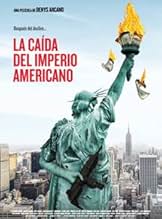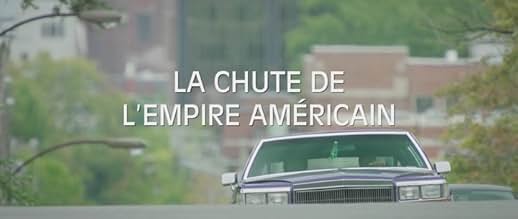IMDb रेटिंग
6.9/10
4.5 हज़ार
आपकी रेटिंग
अपनी भाषा में प्लॉट जोड़ेंA shy and insecure delivery truck driver accidentally arrives on the scene of a major crime and picks up two bags of cash and hides them. Only the help of a prostitute and a former biker rel... सभी पढ़ेंA shy and insecure delivery truck driver accidentally arrives on the scene of a major crime and picks up two bags of cash and hides them. Only the help of a prostitute and a former biker released from jail might get him out of trouble.A shy and insecure delivery truck driver accidentally arrives on the scene of a major crime and picks up two bags of cash and hides them. Only the help of a prostitute and a former biker released from jail might get him out of trouble.
- पुरस्कार
- 2 जीत और कुल 6 नामांकन
Patrick Abellard
- Jacmel Rosalbert
- (as Patrick Emmanuel Abellard)
फ़ीचर्ड समीक्षाएं
What a director Denys Arcand is - all the way from "Jesus of Montreal" to this superb classic. It is truly a magnificent plot that manages to have its cake and eat it too in that we are dealing with more or less petty crime in the context of larger social crimes. To me the lead roles come off so well because of fine performances - there's a humanity here at work that truly appeals to me. Alexandre Landry as a naive philosophical type who hasn't really got a clue but is kind-hearted and Maripier Morin as sex worker as clever as they come drew me in deeply. The highlight the social context which Arcand is at pains to adumbrate without it overwhelming the story's unfolding into something one might describe as worthwhile and meaningful for an audience whilst also being suspensful. Montreal and Quebec
are served well by such productions.
I loved this story of a way over-educated nerd who's filled with Marxist claptrap making a conscious decision to steal bagfuls of cash. Typical of Arcand, the film is very talky, but in a dry and deadpan way that is quite amusing. It's a funny version of Dostoevsky by way of Godard and Woody Allen.
"The fall of the American empire" begins just like "No country for old men" (2007, Joel & Ethan Coen), a casual passer by takes possession of the loot of a crime that has horribly gone wrong.
The rest of the film however is quite different. A team consisting of a nerd (Pierre Paul Daoust played by Alexandre Landry), a prostitute (Camille Lafontaine played by Maripier Morin) and an ex criminal (Sylvain Bigras played by Rémy Girard) set up an ingenious money laundring scheme to help the homeless people of Montreal.
The nerd is not a "computer nerd" but a "philosophy nerd". At the start of the film he has an awkward conversation with his girl friend, framing Pierre Paul as rather autistic. His relatively smooth interaction with homeless people later in the movie is somewhat at odds with this first impression.
"The fall of the American empire" is obviously not realistic, and that is no problem. The film is a sort of modern Robin Hood and also a "Pretty woman" (1990, Garry Marshall) in reverse, although I am still puzzling what "in reverse" really means. Does it mean that in this case the woman (Camille) is transforming the man (Pierre Paul) and making him less naive? Or does it mean that the man still is transforming the woman but introduces her from the high society (Camille is a very expensive call girl before she meets Pierre Paul) to the low society in stead of the other way round?
The weak spot of the film is its social critism. It is clear that the director sympathizes with the homeless and that they are the victims of capitalist society. But the question is who is the culprit? In recent films of Ken Loach (of the same generation as Denys Arcand) this question is clearly answered. In "I Daniel Blake" (2016) it is the government bureacracy and in "Sorry we missed you" (2019) it is the principal of the self employed person. In "The fall of the American empire" it seems to be the capital market in general, but this is too vague and too impersonal. When you want to tell a story about the perversions of the capital market "The big short" (2015, Adam McKay) does a better job.
The rest of the film however is quite different. A team consisting of a nerd (Pierre Paul Daoust played by Alexandre Landry), a prostitute (Camille Lafontaine played by Maripier Morin) and an ex criminal (Sylvain Bigras played by Rémy Girard) set up an ingenious money laundring scheme to help the homeless people of Montreal.
The nerd is not a "computer nerd" but a "philosophy nerd". At the start of the film he has an awkward conversation with his girl friend, framing Pierre Paul as rather autistic. His relatively smooth interaction with homeless people later in the movie is somewhat at odds with this first impression.
"The fall of the American empire" is obviously not realistic, and that is no problem. The film is a sort of modern Robin Hood and also a "Pretty woman" (1990, Garry Marshall) in reverse, although I am still puzzling what "in reverse" really means. Does it mean that in this case the woman (Camille) is transforming the man (Pierre Paul) and making him less naive? Or does it mean that the man still is transforming the woman but introduces her from the high society (Camille is a very expensive call girl before she meets Pierre Paul) to the low society in stead of the other way round?
The weak spot of the film is its social critism. It is clear that the director sympathizes with the homeless and that they are the victims of capitalist society. But the question is who is the culprit? In recent films of Ken Loach (of the same generation as Denys Arcand) this question is clearly answered. In "I Daniel Blake" (2016) it is the government bureacracy and in "Sorry we missed you" (2019) it is the principal of the self employed person. In "The fall of the American empire" it seems to be the capital market in general, but this is too vague and too impersonal. When you want to tell a story about the perversions of the capital market "The big short" (2015, Adam McKay) does a better job.
The last Arcand's movie "Le règle de la beauté" (An Eye for Beauty) was a big disappointment from the man who gave us Decline of the American Empire, The Barbarian Invasions who won an Oscar, and Jesus of Montreal.
In the first 5 minutes of the opening, you can feel that this will be good. Arcand is at his best when he has those witty dialogues. Sarcastic, just like he was in his best movies.
The best guess of Arcand was to use Maripier Morin, whose is not an actress but a girl who started in reality TV shows. Well, she's good. With the right director and some talent, you can be good. She plays a high-class hooker, not in the typical way we usually see that role, but for her first major role, it's impressing.
Alexandre Landry, the guy who ends up with the stollen money is a very good actor, hope we'd see him more often.
The love interest between those two could be more convincing, this is the only problem with that script, hard to understand why she'd fall for him. Would have needed a few extra scenes to make it more believable.
If you like Arcand's dialogue and criticism of the American Society, you will smile for 2 hours.
French-Canadian filmmaker Denys Arcand won the Best Foreign Language Oscar for THE BARBARIAN INVASIONS (2003), and has gained a very loyal group of followers for his films. It should be noted that, despite the title, this is not a sequel or prequel to Arcand's 1986 film THE DECLINE OF THE AMERICAN EMPIRE. This one is a comedy-crime drama that is as cynical as it is witty, and perhaps as much social commentary as satire. It's yet another rip on capitalism while showing that idealism can work wonders (at least if it's well funded).
"Intelligence is a handicap." That's what Pierre-Paul Daoust (played by Alexandre Landry) tells his girlfriend as he breaks up with her in a café. When she points out that he's a delivery driver (similar to UPS), Pierre-Paul riffs on a number of famous writers and philosophers who he claims were dumb as rocks. Her inquiry into Trump being elected President leads to his conclusion, "imbeciles worship cretins". He is the kind of guy that has an answer for everything, and possesses a type of oratory expertise that makes his excuses sound like scientific explanations.
One day while on his route, he stumbles into a robbery gone way wrong. Two thieves were in the process of stealing gang/mob money (and lots of it) when a shooting broke out. In the immediate aftermath, Pierre-Paul makes the snap decision to toss the two huge bags of cash into the back of his deliver truck and take off. This kicks off a chain of events that includes his crossing paths with Aspasie/Camille (Maripier Morin) a high dollar escort whose website features a quote from "Racine". Pierre-Paul is a Ph.D. in Philosophy, so he takes this as a sign.
Shortly after, Pierre-Paul is meeting with Sylvain "the brain" (Arcand regular Remy Girard), a recently released from prison biker who has become an expert on money laundering. The three form an odd partnership and are followed wherever they go by a couple of police detectives. Camille introduces Sylvain and Pierre-Paul to Mr. Taschereau (Pierre Curzi), her dapper former lover who also happens to be the foremost authority on international tax evasion and high finance.
The running joke here is that Pierre-Paul is an upright citizen who has never done anything remotely illegal in his life. In fact, he regularly doles out money to Quebec's homeless and those down on their luck. He also volunteers regularly at a shelter that feeds those in need. The obvious statement here is pointing out the great divide between the wealthy and the poor.
Arcand's film is close to being very good, but falls short in too many areas to reach the height it desires. There is a torture scene that seems totally out of place compared to the tone of the rest of the film, and I refuse to make the link to PRETTY WOMAN - another film where the rich guy wins over the good-hearted sex worker. This film talks about "providence" and just rewards that rarely happen. Is it acceptable to do the wrong thing for the right reasons? Does doing good correct a wrong? Heck, is it even wrong to steal from criminals? What the film actually does is serve up obvious targets with no real solutions offered. The self-congratulatory ending with close-up shots of Quebec's homeless doesn't help.
One day while on his route, he stumbles into a robbery gone way wrong. Two thieves were in the process of stealing gang/mob money (and lots of it) when a shooting broke out. In the immediate aftermath, Pierre-Paul makes the snap decision to toss the two huge bags of cash into the back of his deliver truck and take off. This kicks off a chain of events that includes his crossing paths with Aspasie/Camille (Maripier Morin) a high dollar escort whose website features a quote from "Racine". Pierre-Paul is a Ph.D. in Philosophy, so he takes this as a sign.
Shortly after, Pierre-Paul is meeting with Sylvain "the brain" (Arcand regular Remy Girard), a recently released from prison biker who has become an expert on money laundering. The three form an odd partnership and are followed wherever they go by a couple of police detectives. Camille introduces Sylvain and Pierre-Paul to Mr. Taschereau (Pierre Curzi), her dapper former lover who also happens to be the foremost authority on international tax evasion and high finance.
The running joke here is that Pierre-Paul is an upright citizen who has never done anything remotely illegal in his life. In fact, he regularly doles out money to Quebec's homeless and those down on their luck. He also volunteers regularly at a shelter that feeds those in need. The obvious statement here is pointing out the great divide between the wealthy and the poor.
Arcand's film is close to being very good, but falls short in too many areas to reach the height it desires. There is a torture scene that seems totally out of place compared to the tone of the rest of the film, and I refuse to make the link to PRETTY WOMAN - another film where the rich guy wins over the good-hearted sex worker. This film talks about "providence" and just rewards that rarely happen. Is it acceptable to do the wrong thing for the right reasons? Does doing good correct a wrong? Heck, is it even wrong to steal from criminals? What the film actually does is serve up obvious targets with no real solutions offered. The self-congratulatory ending with close-up shots of Quebec's homeless doesn't help.
क्या आपको पता है
- ट्रिवियाBenoît Brière and Gaston Lepage reprise their roles from Joyeux Calvaire (1996), also directed by Denys Arcand.
- गूफ़There is no way a gangster who was in prison for money laundering or similar crimes would ever be allowed to take college courses in Business Finance.
टॉप पसंद
रेटिंग देने के लिए साइन-इन करें और वैयक्तिकृत सुझावों के लिए वॉचलिस्ट करें
- How long is The Fall of the American Empire?Alexa द्वारा संचालित
विवरण
- रिलीज़ की तारीख़
- कंट्री ऑफ़ ओरिजिन
- आधिकारिक साइटें
- भाषाएं
- इस रूप में भी जाना जाता है
- The Fall of the American Empire
- फ़िल्माने की जगहें
- Restaurant Délithèque, 2475 Boulevard Rosemont, मॉन्ट्रियल, क्यूबेक, कनाडा(Linda breaks up with Pierre-Paul at the restaurant)
- उत्पादन कंपनियां
- IMDbPro पर और कंपनी क्रेडिट देखें
बॉक्स ऑफ़िस
- बजट
- CA$69,00,000(अनुमानित)
- US और कनाडा में सकल
- $21,78,460
- US और कनाडा में पहले सप्ताह में कुल कमाई
- $3,38,216
- 1 जुल॰ 2018
- दुनिया भर में सकल
- $41,10,928
- चलने की अवधि2 घंटे 7 मिनट
- रंग
- ध्वनि मिश्रण
- पक्ष अनुपात
- 2.39 : 1
इस पेज में योगदान दें
किसी बदलाव का सुझाव दें या अनुपलब्ध कॉन्टेंट जोड़ें

टॉप गैप
By what name was La chute de l'empire américain (2018) officially released in India in English?
जवाब

![Bande-annonce [OV]](https://m.media-amazon.com/images/M/MV5BNzdjZTUwY2EtZDZiOS00YzY0LTlhMGQtYTQwZWE2ZmMxNTM5XkEyXkFqcGdeQXRyYW5zY29kZS13b3JrZmxvdw@@._V1_QL75_UX500_CR0)





































